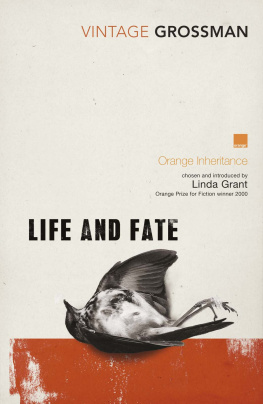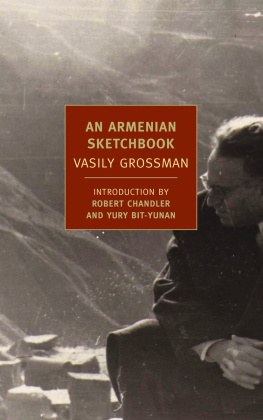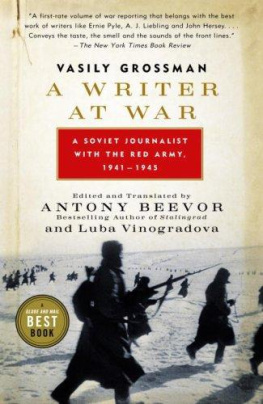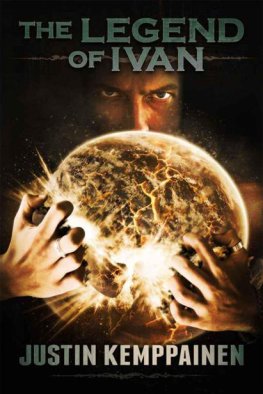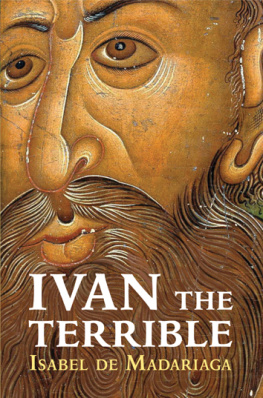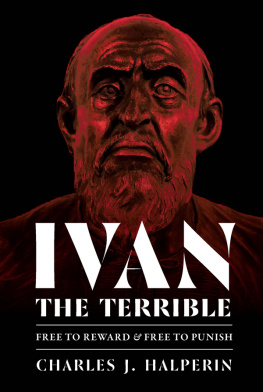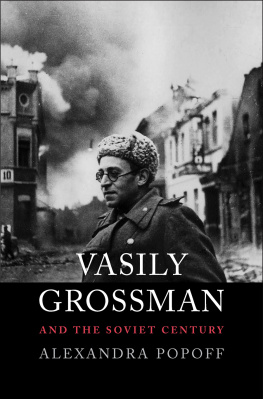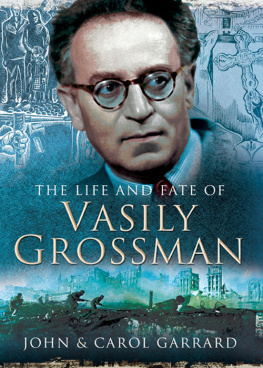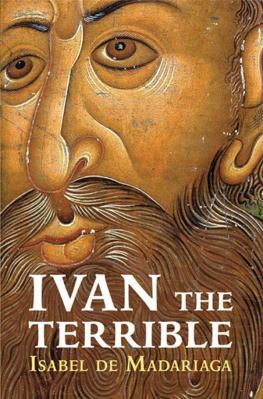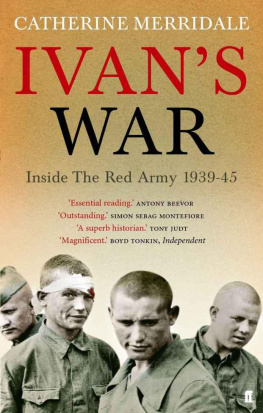
VASILY SEMYONOVICH GROSSMAN was born on December 12, 1905, in Berdichev, a Ukrainian town that was home to one of Europes largest Jewish communities. In 1934 he published both In the Town of Berdicheva short story that won the admiration of such diverse writers as Maksim Gorky, Mikhail Bulgakov, and Isaak Babeland a novel, Glyukauf, about the life of the Donbass miners. During the Second World War, Grossman worked as a reporter for the army newspaper Red Star, covering nearly all of the most important battles from the defense of Moscow to the fall of Berlin. His vivid yet sober The Hell of Treblinka (late 1944), one of the first articles in any language about a Nazi death camp, was translated and used as testimony in the Nuremberg trials. His novel For a Just Cause (originally titled Stalingrad ) was published in 1952 and then fiercely attacked. A new wave of purgesdirected against the Jewswas about to begin; but for Stalinsdeath in March 1953, Grossman would almost certainly have been arrested. During the next few years Grossman, while enjoying public success, worked on his two masterpieces, neither of which was to be published in Russia until the late 1980s: Life and Fate and Everything Flows. The KGB confiscated the manuscript of Life and Fate in February 1961. Grossman was able, however, to continue working on Everything Flows, a work even more critical of Soviet society than Life and Fate, until his last days in the hospital. He died on September 14, 1964, on the eve of the twenty-third anniversary of the massacre of the Jews of Berdichev, in which his mother had died.
ROBERT CHANDLER s translations of Sappho and Guillaume Apollinaire are published in the series Everymans Poetry. His translations from Russian include Vasily Grossmans Life and Fate, Leskovs Lady Macbeth of Mtsensk and Aleksander Pushkins Dubrovsky and The Captains Daughter. Together with his wife, Elizabeth, and other colleagues he has co-translated numerous works by Andrey Platonov. One of these, Soul, was chosen in 2004 as best translation of the year from a Slavonic language by the AATSEEL (the American Association of Teachers of Slavonic and East European Languages); it was also shortlisted for the 2005 Rossica Translation Prize and the Weidenfeld European Translation Prize. Robert Chandlers translation of Hamid Ismailovs The Railway won the AATSEEL prize for 2007 and received a special commendation from the judges of the 2007 Rossica Translation Prize. Robert Chandler is the editor of Russian Short Stories from Pushkin to Buida and the author of a biography of Alexander Pushkin.
ELIZABETH CHANDLER is a co-translator of Platonovs Soul and Pushkins The Captains Daughter.
ANNA ASLANYAN s translations into Russian include works of fiction by Mavis Gallant, Zadie Smith, Jonathan Lethem, Rod Liddle, and Ali Smith. She is a contributor to the BBC Russian Service.
Everything Flows
Vasily Grossman
Translated from the Russian by Robert and Elizabeth Chandler
with Anna Aslanyan
New York Review Books
New York

Contents
Introduction
Vasily Grossman has become recognized not only as one of the great war novelists of all time but also as one of the first and most important of witnesses to the Shoah. The Hell of Treblinka (late 1944), one of the first articles in any language about a Nazi death camp, was used as testimony in the Nuremberg trials. And there may be no more powerful lament for East European Jewry than the chapter of Life and Fate that has become known as The Last Letterthe letter that Anna Semyonovna, a fictional portrait of Grossmans mother, writes in the last days of her life and manages to have smuggled out of the Jewish ghetto of a town under Nazi occupation. This chapter has been staged as a one-woman play in Paris, New York, and Moscow.
Few novelists have incorporated more history into their novels than Grossman. Everything Flows is a quarter of the length of Life and Fate, but its historical scope is in some respects broader. The central storyabout the struggle of a fifty-year-old man, Ivan Grigoryevich, to find a place for himself in post-Stalinist Russia after losing thirty years of his life to the Gulagis interrupted by chapters about Moscow prisons in 1937, about the sufferings of women in the camps, about Stalins destruction of Soviet science in the late 1940s, about the anti-Jewish campaign of the early 1950s, about Lenin and Stalin and the roots of Russian slavery. Many of Grossmans thoughtsespecially the suggestion that Stalin was heir both to the Russian revolutionary tradition and to the Russian secret police, and that his paranoia arose in part from the conflict between these two forces within his psychestill seem startlingly bold. The novel even has room for a small playlet, a mock trial that follows Ivans chance meeting with the informer responsible, long ago, for his being sent to the camps: the reader is asked to pronounce judgment on four informers, four different Judases. The arguments Grossman gives to both prosecution and defense are unexpected and lively; as members of the jury, we are constantly taken off guard, repeatedly forced to change our minds. The trial eventually falls apart, dissolved by the reflection that the living have, without exception, compromised themselves and that only the deadwho, of course, cannot speakhave the right to pass judgment.
Some of these digressions are introduced as Ivans thoughts or writings. The most powerful chapter of all, an account of the 193233 Terror Famine that brought about the deaths of three to five million peasants in the Ukraine, is narrated by Ivans landlady, Anna Sergeyevna, just after she has become his lover. Anna Sergeyevna was herself involved, as a minor Party official, in the implementation of the measures that caused this famine. She is an attractive figure, and we cannot help but identify not only with the middle-aged Anna telling the story but also with the young Anna of the time of the famine; once again, Grossman denies the reader the luxury of unalloyed indignation. This chapter about the least-known act of genocide of the last century is subtle, complex, and unbearably lucid. Only Dante, in his account of Ugolino and his sons starving to death in a locked tower, has written of death from hunger with equal power.
Almost every step of Grossmans careereven after his deathhas been marked by long delays and tedious, protracted battles. Editors, publishers, and politicians seem to have responded to the painful and intractable nature of Grossmans subject matter with an equal intractability of their own. For a Just Cause, the fine but more orthodox war novel to which Life and Fate is a sequel, was originally titled Stalingrad. This title was abandoned after Mikhail Sholokhov, by then the grand old man of Soviet letters, asked at an editorial meeting, Who gave him the right to write about Stalingrad? Sholokhovs implication, clearly understood by everyone present, was that a mere Jew had no right to be writing about one of the most glorious chapters of Russian historylet alone to be writing about it with such truthfulness. From 1949 to 1952, Grossman and his editors struggled to meet the demands of the authorities. No less than twelve sets of authors proofs remain, and the editors of


